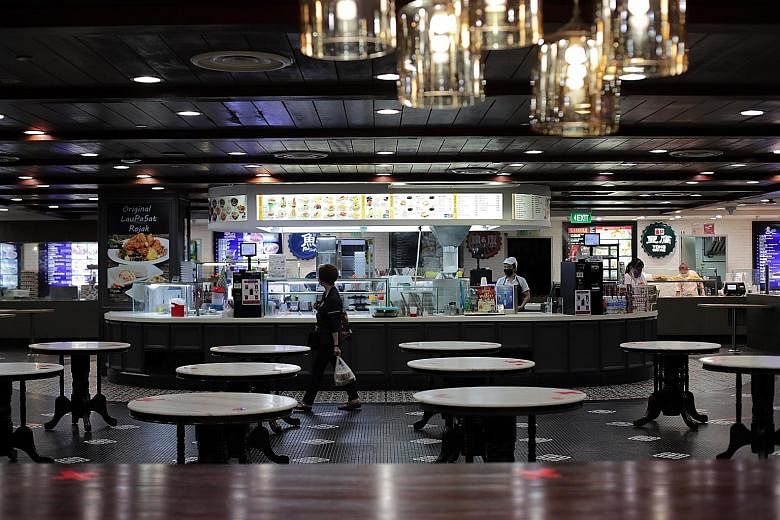It will not be possible to allow dining in at food and beverage (F&B) outlets in the first phase of Singapore's reopening after the circuit breaker, said Health Minister Gan Kim Yong yesterday.
Doing so would lead to a "general opening up of society" and could cause a spike in coronavirus cases, he noted, forcing the country to reinstate safe distancing measures.
"When you allow gatherings in F&B outlets, it means you must also allow gatherings outside (this setting)," Mr Gan told Parliament. "It doesn't make sense to allow only F&B gatherings."
He was responding to Mr Lim Biow Chuan (Mountbatten), who said many F&B outlet owners are asking for restrictions to be eased earlier, as they may not be able to keep their businesses afloat until phase two begins.
Mr Lim suggested allowing dining in, as long as customers are spaced out at a safe distance.
Mr Gan replied that the multi-ministry task force that he co-chairs has discussed the issue at length.
He acknowledged that while many F&B outlets are allowed to deliver food and sustain a basic level of business, that is "not enough". There are also outlets that cannot do delivery as it is not economical.
However, the task force concluded that Singapore has to take a more cautious approach in the first phase of its reopening.
"We are not prepared to open up too early, too quickly, because that may result in more cases emerging and in turn will require us to reimpose some measures, and as a result defer and slow down phase two," Mr Gan said.
"So we prefer to keep phase one safe, so that we can open phase two safely and, hopefully, faster."
National Development Minister Lawrence Wong, who co-chairs the task force, said last month that the authorities will make a decision by the middle of this month on when to move to phase two. This means that the second phase could start before the end of this month, provided infection numbers stay "low and stable".
Mr Gan urged Singaporeans to be patient and press on with their efforts to ensure community transmission of the virus remains low.
"We understand the anxiety that our people are facing, and are acutely aware of the economic and social impact of prolonged closure of various sectors," he said.
"All of us want to get back to normal as soon as possible, and to be able to see our friends and family members whom we have not seen for some time."
Mr Murali Pillai (Bukit Batok) asked about the merits of easing circuit breaker measures now, given that the daily number of new Covid-19 cases in foreign worker dormitories remains in the hundreds. He also asked how infection would be contained within the dormitories.
The situation in the dormitories is now under control, Mr Gan replied, adding: "The time had come to begin our journey to resume activities, gradually and cautiously."
Although the number of cases found among the migrant worker population may remain high for some time, some may be indicative of past infections rather than active cases, he added.
Dormitory operators have implemented stricter rules on entry and exit, and only workers who have recovered or tested negative will be allowed to leave the premises. Even so, they will be allowed to leave only for work, and arrangements have been made to transport them to and from their workplaces.
Measures have also been put in place to limit the mixing of dormitory residents from different blocks and levels, such as the staggered use of common facilities.
Workers living in dormitories will be tested regularly, and have to report their status on a daily basis.
Among the wider community, the number of Covid-19 cases has dropped from a daily average of 31 at the start of the circuit breaker, to four in the past week.
"As restrictions are eased and more activities resume, it becomes even more critical that each of us exercises strong social responsibility to ensure that community transmission remains low," Mr Gan added.
"We need everyone to play his part: Wear a mask when outside your home, maintain good personal hygiene and observe safe opening measures."


